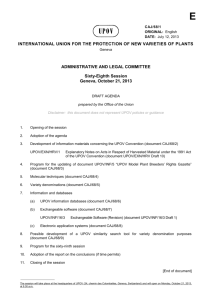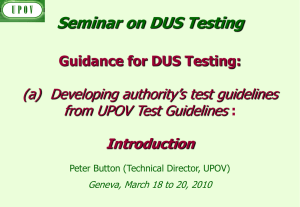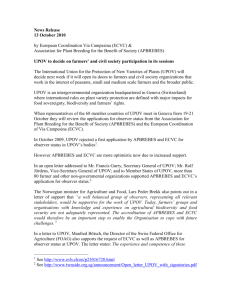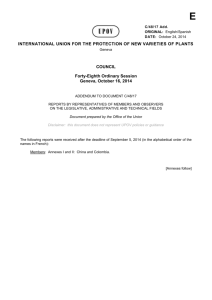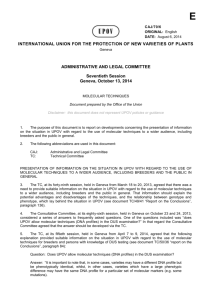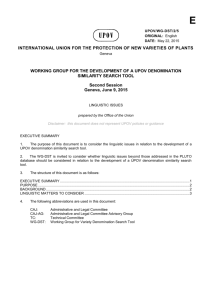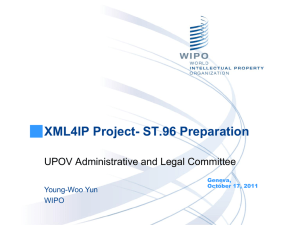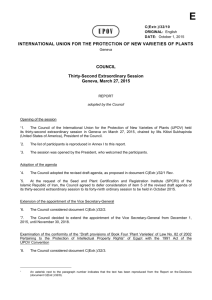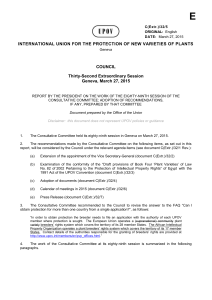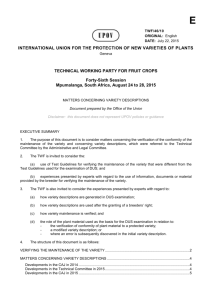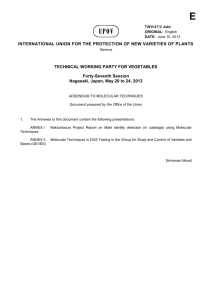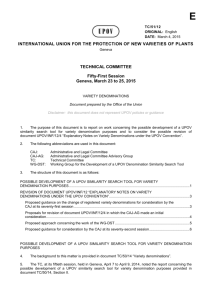International Treaty on Plant Genetic Resources for Food and
advertisement
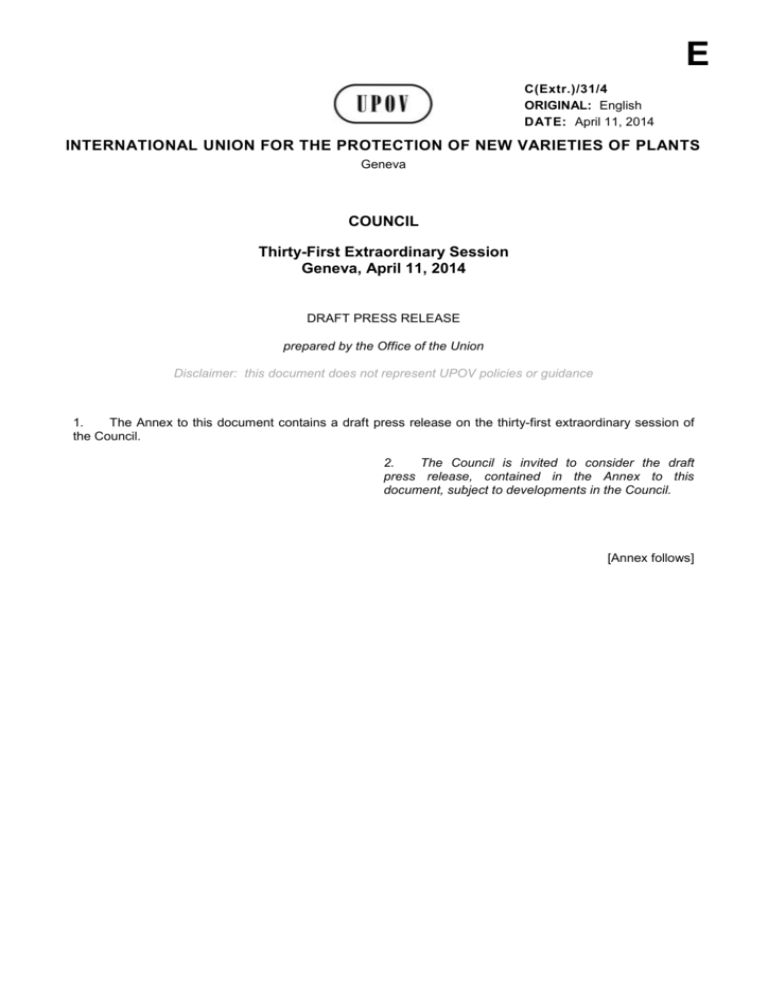
E C(Extr.)/31/4 ORIGINAL: English DATE: April 11, 2014 INTERNATIONAL UNION FOR THE PROTECTION OF NEW VARIETIES OF PLANTS Geneva COUNCIL Thirty-First Extraordinary Session Geneva, April 11, 2014 DRAFT PRESS RELEASE prepared by the Office of the Union Disclaimer: this document does not represent UPOV policies or guidance 1. The Annex to this document contains a draft press release on the thirty-first extraordinary session of the Council. 2. The Council is invited to consider the draft press release, contained in the Annex to this document, subject to developments in the Council. [Annex follows] C(Extr.)/31/4 ANNEX DRAFT PRESS RELEASE UPOV Press Release 96 Geneva, April 11, 2014 UPOV Council Holds its Thirty-First Extraordinary Session The Council of the International Union for the Protection of New Varieties of Plants (UPOV) held its thirty-first extraordinary session on April 11, 2014. Round-up of key developments: [Positive] decision on the Draft ARIPO Protocol for the Protection of New Varieties of Plants The Council took a positive decision on the conformity of the African Regional Intellectual Property Organization (ARIPO) Draft Protocol for the Protection of New Varieties of Plants with the provisions of the 1991 Act of the International Convention for the Protection of New Varieties of Plants (UPOV Convention). The Draft Protocol, once adopted with no changes and in force, would allow the Contracting States to the Protocol and ARIPO, in relation to the territories of the Contracting States bound by the Protocol, to deposit their instruments of accession to the UPOV Convention. International Treaty on Plant Genetic Resources for Food and Agriculture (ITPGRFA) The Council expressed its appreciation to the Governing Body of the ITPGRFA (GB) for the thanks the GB had offered to UPOV for the practical support UPOV had provided to the ITPGRFA and the Council confirmed its continuing commitment to mutual supportiveness. In response to an invitation by the GB to identify with the Secretary of the ITPGRFA and the Secretariat of the World Intellectual Property Organization (WIPO) possible areas of interrelations among the international instruments of the ITPGRFA, WIPO and UPOV, the Council decided to explore the idea of a joint publication on interrelated issues regarding innovation and plant genetic resources and other suitable initiatives. Frequently Asked Questions The Council agreed the answers to the following frequently asked questions (see [link]): Who can attend UPOV meetings? • • • • • • • • • • • • • • • • What is UPOV? What does UPOV do? Who can attend UPOV meetings? What is a plant variety? Why do farmers and growers need new plant varieties? Why is plant variety protection necessary? How does plant variety protection work? What are the requirements for protecting a new plant variety? Why does UPOV require varieties to be uniform and stable; doesn’t that lead to a loss of diversity? Can breeders use a protected variety in their breeding programs Who can protect a plant variety? Where do I apply for protection of a variety? Can I obtain protection for more than one country from a single application? What are the benefits of plant variety protection and UPOV membership? What is the effect of plant variety protection on varieties that are not protected (e.g. traditional varieties, landraces etc.)? What is the relationship between the UPOV Convention and international treaties concerning genetic resources, e.g. the Convention on Biological Diversity (CBD) and the International Treaty on Plant Genetic Resources for Food and Agriculture (ITPGRFA) C(Extr.)/31/4 Annex, page 2 • • • • • • • • • • • • What is the relationship between patents and plant breeders’ rights What is the relationship between plant breeders’ rights and measures regulating commerce, e.g. seed certification, official registers of varieties admitted to trade (e.g. National List, Official Catalogue) etc.? Can I protect an existing plant or variety that I discover?] Does the UPOV Convention allow a variety to be refused protection because it is genetically modified? Can I use plant variety protection to protect the following: - a trait (e.g. disease resistance, flower color) - a chemical or other substance (e.g. oil, DNA) - a plant breeding technology (e.g. tissue culture)? Can I protect a hybrid variety under the UPOV system? Can a farmer replant seed of a protected variety without the authorization of the breeder? Can a farmer sell seed of a protected variety without the authorization of the breeder? How do I know if a variety is protected? Who is responsible for enforcing plant breeders’ rights? Does UPOV allow molecular techniques (DNA profiles) in the examination of Distinctness, Uniformity and Stability (“DUS”)? Is it true that UPOV only promotes commercially bred plant varieties geared to industrialized farmers? Launch of Advanced Distance Learning Course[s] “Examination of Applications for Plant Breeders’ Rights” The following program was agreed for the launch of the advanced distance learning course[s] “Examination of Applications for Plant Breeders’ Rights”: February/March 2015 April/May 2015 DL-305-1 (E, F, S) DL-305-2 (E, F, S) More detailed information concerning the course content and on-line registration will be provided on the UPOV website: http://www.upov.int/resource/en/training.html). Test Guidelines The Council welcomed the adoption by the Technical Committee of six new Guidelines for the Conduct of Tests for Distinctness, Uniformity and Stability (Test Guidelines) and nine revised Test Guidelines. UPOV has now developed 301 Test Guidelines, all of which are freely available on the UPOV website (http://www.upov.int/test_guidelines/en/). Experience of members of the Union in the Examination of New Plant Varieties The Council noted that the number of genera and species for which members of the Union had indicated their practical experience in the examination of distinctness, uniformity and stability (DUS) had increased from 2,589 in 2013 to 3,305 in 2014 (+ 27.7%). The Council also noted that information on members of the Union with practical experience in DUS examination was freely accessible via the GENIE database. Tribute to Mr. François Boulineau (France), Chairman of the Technical Working Party For Vegetables (TWV) The Council expressed its condolences for the sad loss of Mr. François Boulineau, Chairman of the Technical Working Party for Vegetables (TWV), who had died on December 23, 2013. In addition to being Chairman of the TWV, Mr. Boulineau had brought great experience and expert knowledge to UPOV’s technical work and was a leading expert for a number of important UPOV Test Guidelines. The Council expressed its appreciation for the important contribution that Mr. Boulineau had made to UPOV. For further information about UPOV, please contact the UPOV Secretariat: Tel: (+41-22) 338 9111 Fax: (+41-22) 733 0336 E-mail: upov.mail@upov.int Website: www.upov.int [End of Annex and of document]
